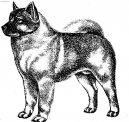Norwegian elkhound black (Dog standard)
Norwegian elkhound black is a typical spitz, squarely built, black hair lying rather close to the body, erect pointed ears, tail curled over the back. proud rise of neck, muscular and athletic.
FCI-Standard N° 268 / 09. 08. 1999 / GB
Norwegian ELKHOUND BLACK
(Norsk Elghund Sort)
TRANSLATION : Norsk Kennel Klub.
ORIGIN : Norway.
DATE OF PUBLICATION OF THE ORIGINAL VALID STANDARD : 09.08.1999.
UTILIZATION : Hound for elk-hunting.
CLASSIFICATION F.C.I. : Group 5 Spitz and primitive types.
Section 2 Nordic Hunting Dogs.
With working trial only for the Nordic countries (Sweden, Norway, Finland).
GENERAL APPEARANCE : A typical spitz, squarely built, black HAIR lying rather close to the BODY, erect pointed ears, TAIL curled over the back. Proud rise of NECK, muscular and athletic.
IMPORTANT PROPORTIONS : Height of withers = length of BODY. Length of muzzle = length of skull.
BEHAVIOUR / TEMPERAMENT :Fearless, energetic and brave.
HEAD : Wedge-shaped, tapering to nose. Clean and rather light, comparatively broad between ears.
CRANIAL REGION :
Skull : Nearly flat.
Stop : Distinct, but not abrupt.
FACIAL REGION :
Nose : Black.
Muzzle : Bridge of the nose straight.
Lips : Tightly closed.
Jaws/Teeth : Scissor bite. Complete dentition.
Eyes : Not protruding. Preferably dark brown.
Ears : Set on high, pricked, height slightly greater than width at the base, pointed.
NECK : Of medium length, firm, without loose SKIN.
BODY :
Topline : Straight from the withers to the croup.
Withers : Well developed.
Back : Straight and strong.
Loin : Well developed, broad and straight.
Croup : Broad, well muscled.
Chest : Relatively deep, with good spring of ribs.
Belly : Slightly tucked up.
TAIL : Set on high. Short, thick, with thick and close COAT, but not with a flag. Tightly curled over the back, but not carried on either side.
LIMBS
FOREQUARTERS :
GENERAL APPEARANCE : Firm, sinewy and strong, but not heavy.
Shoulders : Sloping.
Upper arm : Moderately sloping.
Elbow: Well set, turned neither in nor out.
Forearm : Straight.
Pastern : Moderately sloping seen from the side.
ForeFEET : Rather small, somewhat oval, compact and not turned outwards.
HINDQUARTERS :
GENERAL APPEARANCE : Moderately angulated in stifle and hock. Parallel seen from behind. Dewclaws not desired.
Upper thigh : Muscular and broad.
Stifle : Moderately angulated.
Lower thigh : Of medium length.
Hock joint : Moderately angulated.
Hock : Moderately sloping seen from the side, parallel seen from behind.
Hind FEET : Rather small, somewhat oval, compact.
GAIT / MOVEMENT : Light and effortless. Parallel seen both from the front and behind.
COAT
HAIR : Dense and rough, but lying close to the BODY. On HEAD and front of legs short and smooth; longer on chest and NECK, back of legs and the underside of TAIL. The COAT is composed of a longish and coarse topCOAT and a soft, woolly and black underCOAT.
COLOUR : Shining black. A little white on chest and FEET may be tolerated.
SIZE :
Height at withers : Males 46-49 cm. Ideal height 47 cm.
Females 43-46 cm. Ideal height 44 cm.
FAULTS : Any departure from the foregoing points should be considered a fault and the seriousness with which the fault should be regarded should be in exact proportion to its degree.
Pincer bite, irregular bite.
Lacking underCOAT.
White HAIRs, white on the TAIL.
White socks.
Stressed, nervous, barking.
SERIOUS FAULTS :
Naturally short TAIL.
ELIMINATING FAULTS :
Aggresive or overly shy.
Bite over- or undershot.
Height at withers under 3 or above 4 cm from the ideal height.
Any dog clearly showing physical or behavioural abnormalities shall be disqualified.
N.B. : Male animals should have two apparently normal testicles fully descended into the scrotum.
Source: FCI >>> |
